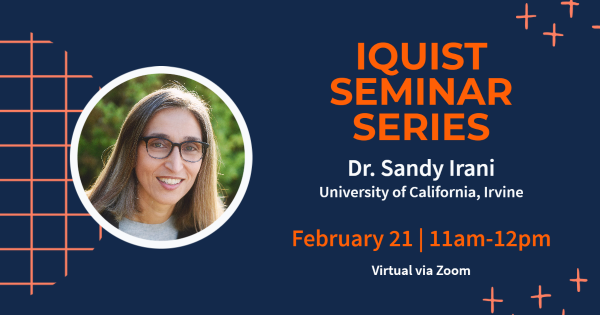IQUIST Seminar: "Computational Complexity of Quantum Systems," Sandy Irani, University of California, Irvine

- Sponsor
- IQUIST
- Speaker
- Sandy Irani, Professor, Computer Science, University of California, Irvine
- Contact
- Hannah Stites
- hstites2@illinois.edu
- Phone
- 217-300-4072
- Views
- 188
- Originating Calendar
- IQUIST Seminar Series
Computational Complexity of Quantum Systems
Abstract: One of the goals of quantum information theory is to understand quantum systems from the standpoint of computational complexity. How difficult is it to compute fundamental properties of a quantum system or simulate a particular system over time? Physicists have been using computers for decades to understand various aspects of quantum systems, but these methods are typically heuristic and achieve success on only limited classes of systems. This talk will give an overview of recent developments in the effort to understand these problems from a formal complexity-theoretic point of view. In particular, one of the most basic properties of a system is its lowest energy state or ground state. I will survey results on the complexity of ground states of finite and infinite systems and the computational resources required to compute them. I will also discuss heuristics to find ground states on more near-term quantum computers.
Bio: Sandy Irani graduated with a degree in in EECS from Princeton University in 1986. She completed her PhD in Computer Science at University of California, Berkeley in 1991 and the following year was a recipient of the University of California President's Postdoctoral Fellowship. In the Fall of 1992, she joined the faculty of University of California Irvine where she is currently a full professor. She served as chair of the Computer Science Department from 2005 to 2008 and from 2010 to 2012. In the first part of her career, her research focused on on-line algorithms and their applications to scheduling and resource allocation. More recently, she has been working in Quantum Computation with a focus on Quantum Complexity Theory. She is also the author of a web-based, interactive textbook replacement on Discrete Mathematics in collaboration with zyBooks, Inc. She is the 2021-2022 recipient of the UC Irvine Distinguished Faculty Award for Teaching and a Fellow of the ACM